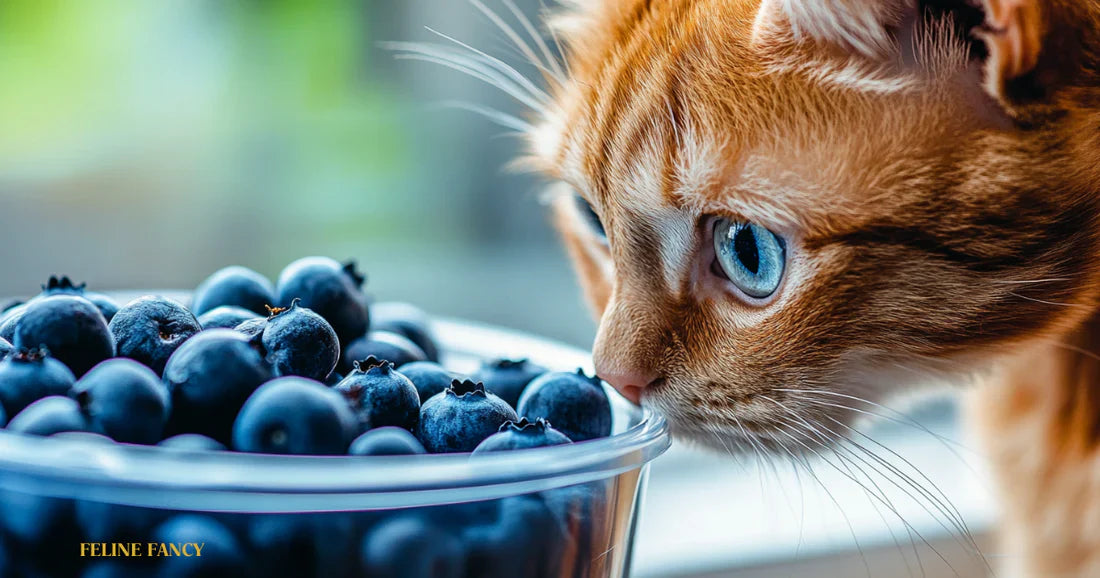If you’ve ever been snacking on a handful of blueberries only to notice your cat watching with wide, curious eyes, you’re not alone. As devoted pet parents, we often want to share our lives—including our food—with our feline companions. But while some human foods are completely off-limits (we’re looking at you, chocolate and onions), others leave us wondering. One frequently asked question is: Can cats have blueberries? Are these antioxidant-rich berries a safe snack, or do they fall into the risky treat category?
Let’s peel back the layers on this topic and find out what science, vets, and real-life cat owners have to say.
Why Blueberries Are a Topic of Curiosity Among Cat Lovers
Cats are natural explorers, and when it comes to food, they often show interest in the things we eat—not because they’re hungry, but because they’re intrigued. Many owners have reported their cats licking yogurt lids, pawing at sliced fruits, or stealing crumbs from the counter.
That brings us to blueberries: small, juicy, and packed with health benefits for humans. We call them a superfruit. But does that title carry over to our furry friends?
Can Cats Have Blueberries? The Straight Answer
Yes—cats can eat blueberries in moderation. According to the ASPCA (American Society for the Prevention of Cruelty to Animals), blueberries are non-toxic to cats. This means if your curious kitty happens to nibble on one or two, there’s no immediate cause for concern.
But just because they can eat them doesn’t mean blueberries are a necessary or especially beneficial part of your cat’s diet. Let’s explore why.
Understanding Feline Nutrition: Why Meat Still Matters Most
Unlike humans or even dogs, cats are obligate carnivores. Their bodies are biologically designed to derive nutrients from meat, not plants or fruits. Key nutrients like taurine, arachidonic acid, and certain vitamins can only be found in animal-based sources.
That doesn’t mean a small amount of fruit is harmful—it just means it’s not essential.
So where do blueberries fit in?
Think of them as an occasional bonus treat: a snack that provides a bit of novelty and perhaps a minor antioxidant boost, but not a necessary part of your cat’s daily meals.
Nutritional Benefits of Blueberries for Cats
Let’s be clear—blueberries won’t transform your cat’s health overnight, but they do carry some perks when offered occasionally.
✅ Antioxidants
Blueberries are loaded with antioxidants that help fight free radicals and reduce inflammation. These properties may benefit cats, especially seniors who may be more prone to cell damage.
✅ Vitamin C and K
While cats produce their own vitamin C, the added dose from blueberries isn’t harmful. Vitamin K supports blood clotting and bone health—though cats typically get enough from a balanced diet.
✅ Low in Calories and Sugar
Unlike other fruits, blueberries are naturally low in sugar and calories, making them a safer option for cats in terms of weight and blood sugar balance.
✅ High Water Content
Cats are notoriously poor water drinkers. A juicy blueberry can be a hydrating little boost, especially in warmer weather or for cats who eat mostly dry kibble.
How to Safely Offer Blueberries to Your Cat
So you’ve decided to let your cat try a blueberry. That’s great—but safety first!
1. Wash Thoroughly
Pesticide residue can be harmful. Always rinse blueberries thoroughly before offering them to your pet.
2. Serve in Moderation
Limit blueberries to one or two berries at a time. Overconsumption can cause gastrointestinal upset, including diarrhea or vomiting.
3. Cut or Mash Them
Blueberries are small, but some cats (especially kittens or older cats) may struggle with chewing. Halve or mash the berry to prevent choking.
4. Stick to Fresh or Frozen
Avoid dried, sweetened, or processed blueberries. These often contain sugar or additives that are unsafe for cats.
When Blueberries May Not Be a Good Idea
While most cats can tolerate blueberries well, some may be more sensitive.
Avoid if Your Cat Has Diabetes
Even natural sugar in small amounts can be problematic for diabetic cats.
Not for Cats with Food Allergies or Digestive Issues
If your cat is prone to upset stomachs, even a safe treat like blueberries can trigger discomfort.
Watch for Signs of Allergies
It’s rare, but some cats may develop allergic reactions. Look out for signs like itching, swelling, or breathing difficulty.
If any of these occur, stop immediately and consult your veterinarian.
Fun and Safe Ways to Include Blueberries in Your Cat’s Diet
Looking to spice up your cat’s treat routine? Here are a few creative (and safe) ideas:
Frozen Blueberry Bites
Perfect for hot days, these provide hydration and a crunchy texture your cat might love.
Blueberry Toppers
Add a mashed blueberry on top of their regular food once in a while for a burst of flavor and color.
DIY Cat Treat Mix
Combine a crushed blueberry with plain boiled chicken or a little canned tuna for a mini treat platter.
A Real-Life Story: Meet Shadow, the Blueberry Enthusiast
Shadow, a 4-year-old rescue cat in Oregon, discovered blueberries by accident when his owner dropped one on the kitchen floor. After sniffing and cautiously pawing at it, he took a nibble—and loved it! Now, Shadow gets one blueberry every other week as a special treat. His vet gave the green light, and it’s become a bonding moment between pet and owner.
Just like Shadow, every cat is unique. Some will love the flavor; others won’t even give it a second sniff.
Final Verdict: Blueberries—Safe Snack or Risky Treat?
Verdict: Safe Snack (with limits)
Blueberries can be a fun, safe, and slightly nutritious treat for cats when given occasionally and in small amounts. They’re not harmful, and they may even offer a tiny health benefit—but they should never replace your cat’s core diet of protein-rich, meat-based food.
So the next time your kitty looks longingly at your bowl of blueberries, you can confidently share a berry or two—knowing you’re giving them a safe taste of something new.

